Portland resident Lili Richmond had been battling a cold. When Richmond, a mortgage banker, woke up on a Saturday morning with sludge in her eyes, the 59-year-old knew she needed to get it checked out. But her primary care doctor’s office was closed.
Rather than go to an urgent care clinic, Richmond went to a Minute Clinic in the South Portland CVS. There, she passed the 30-minute wait to see a physician’s assistant by shopping, spending about $40 on magazines, body lotions and vitamins. The physician’s assistant diagnosed her with conjunctivitis and within an hour, she had her prescription. Since the Minute Clinic accepted her insurance, she only paid $20.
“I walked in with minimum expectations and I walked out thinking this is a great resource,” she said.
Retail pharmacies expect Richmond’s experience will become more commonplace as traditional drug stores incorporate walk-in clinics on site. For mega retailers like CVS, blueprints for most new stores include space for walk-in clinics, including those planned for Bath and Forest Avenue in Portland. But even local, independent drug stores are integrating health care practitioners into their retail settings.
At Apothecary by Design’s retail pharmacy on Marginal Way, a women’s health nurse has been on site for years for customers to discuss concerns and to act as a liaison between patient and provider. The retail pharmacy, which was sold to a local partnership in February and is now called Coastal Pharmacy & Wellness, also shares space with a nurse midwife who maintains an independent practice there.
“These models have worked for our patients in terms of an easier, more personal access to health care,” said Stephen Drapeau, principal of Coastal Pharmacy & Wellness. “While big box retail pharmacies maybe pursuing other in-store health care access models, we’ll continue to develop our more personalized approach to health care.”
Services and prices at a glance
In the far corner of the CVS store on Auburn Street in Portland, the words “Minute Clinic” shine in bright red letters.
There, in a small waiting room near the pharmacy, a flat screen TV flashes prices:
“Camp physical – $59; pregnancy test – $69-$99; suture and staple removal – $89-$99;” … the list goes on.
CVS’s Minute Clinics – there’s another on Market Street in South Portland – opened in November, the first examples in Maine of an emerging national trend of retail health clinics. The clinics, which offer significantly more and varied services than the flu shot and blood pressure services routinely offered in pharmacies, provide cheaper and more convenient health care options than conventional physician practices or urgent care clinics.
“Our purpose is to provide high-quality care on a convenient schedule and to treat the patient holistically and to provide the care they need when then need it,” said Ana Zannella, a senior practice manager who oversees CVS Minute Clinics in Maine, New Hampshire and 14 in Massachusetts.
Instead of relying on doctors, retail health clinics are typically staffed with nurse practitioners and physician’s assistants, who are qualified to diagnose and treat illnesses. These clinics can treat relatively minor maladies (skin conditions, aches, pains and minor injuries), perform physicals, provide blood pressure and glucose monitoring and refer patients to hospitals for more serious illnesses and injuries.
At the Portland-area CVS clinics, basic information about a patient and their particular ailment is entered into an electronic kiosk. The patient is then taken into a small exam room. A kiosk displays the estimated wait time. If it’s too long, the patient can ask for a text alert and shop.
Once the door to the exam room is closed, it’s easy to forget there are customers browsing the aisles for items as varied as mouthwash, greeting cards and seasonal decorations. The exam room is similar to any doctor’s office, with a table, eye exam charts, a computer, sink, blood pressure monitors, stethoscopes and the like.
“For my simple symptoms, I will definitely use it in the future as needed,” Richmond said.
A growing trend
Walgreens operates more than 400 of its Healthcare Clinics in a dozen states, but none of them are in Maine. A Walgreens spokesperson said the company continually evaluates when and where to add clinics based on several factors, including the number of health care providers in the area, the footprint of its existing stores, regulatory environments and the overall community needs. In November, Walgreens announced it was acquiring Rite-Aid for $9.4 billion. There are 79 Rite-Aids in Maine, according to the company’s web site, and 11 Walgreens.
CVS Health, meanwhile, operates more than 1,100 Minute Clinics in 33 states and is in the process of rebranding clinics and pharmacies operated by Target, which CVS acquired last summer. That’s up from 400 clinics in 2010.
Since their emergence more than 15 years ago, retail clinics are becoming increasingly common, with more than 10 million visits a year at more than 1,800 clinics nationwide, according to the Robert Wood Johnson Foundation, a national philanthropic organization devoted to health issues. The clinics typically provide basic diagnostic and treatment services, but are expanding to include wellness programs to help people fighting obesity or smoking addictions.
“Retail clinics are filling gaps in our health care system for consumers who are uninsured or underinsured; for families with immediate care needs on weekends and evenings; and for employers, health systems and insurers looking for lower cost sites of care for low acuity conditions,” according to the foundation’s April 2015 report, Building a Culture of Health; The Value Proposition of Retail Clinics. “As the health care system enters a period of profound change, these clinics offer an important locus of patient access within large retail establishments.”
CVS’s Minute Clinics accept many types of insurance and are working to accept Medicaid, according to Nancy Gagliano, M.D., Minute Clinic’s chief medical officer. She said CVS will allow its Maine clinics time to grow this year by word-of-mouth, before considering an expansion. However, she noted that all new CVS stores include space that can be quickly converted into a health clinic.
About half of the Minute Clinic patients do not have a primary care doctor and 85 percent have insurance, Gagliano said. Patients are drawn not only by the convenient hours (nights and weekends), but also by savings, said Gagliano. Services are priced at about 40 percent lower than ERs or urgent care clinics, she said, adding a typical sick visit at a Minute Clinic costs under $99.
Gagliano said the clinics are certified by the Joint Commission, an accreditation typically received by hospitals. The company also does a comprehensive review of their cases – from diagnosis to treatment to wait times – to ensure patients are getting quality care.
Though these clinics are typically located in urban areas with high concentrations of young people, Gagliano said CVS is testing a telehealth pilot project in California to reach more rural areas where low patient volumes cannot support a fully-staffed clinic. In that model, a licensed vocational nurse is on site to help a patient log onto a computer and connect diagnostic equipment, allowing the patient to be evaluated by a nurse practitioner or physician’s assistant who can diagnose diseases and prescribe medications and treatments. So far the results are encouraging, said Gagliano.
“That might provide some future opportunities in states like Maine that has some location without a high population density,” she said.
This story was changed from an earlier version to correct the number of Rite-Aid pharmacies in Maine and clarify the formation of Coastal Pharmacy & Wellness.
Send questions/comments to the editors.

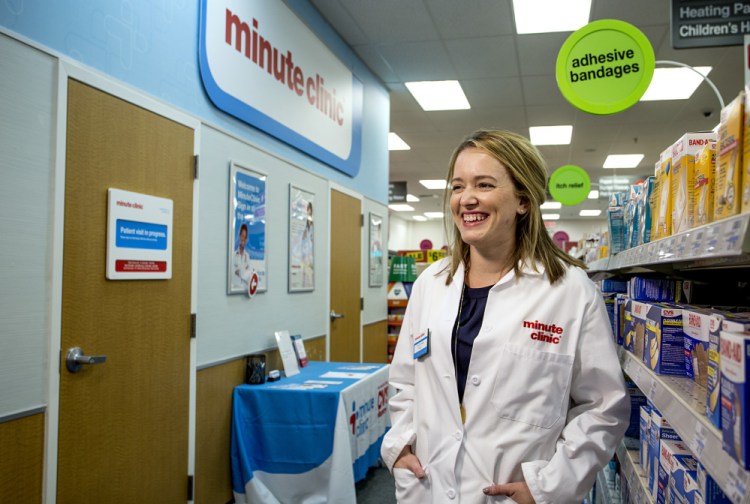
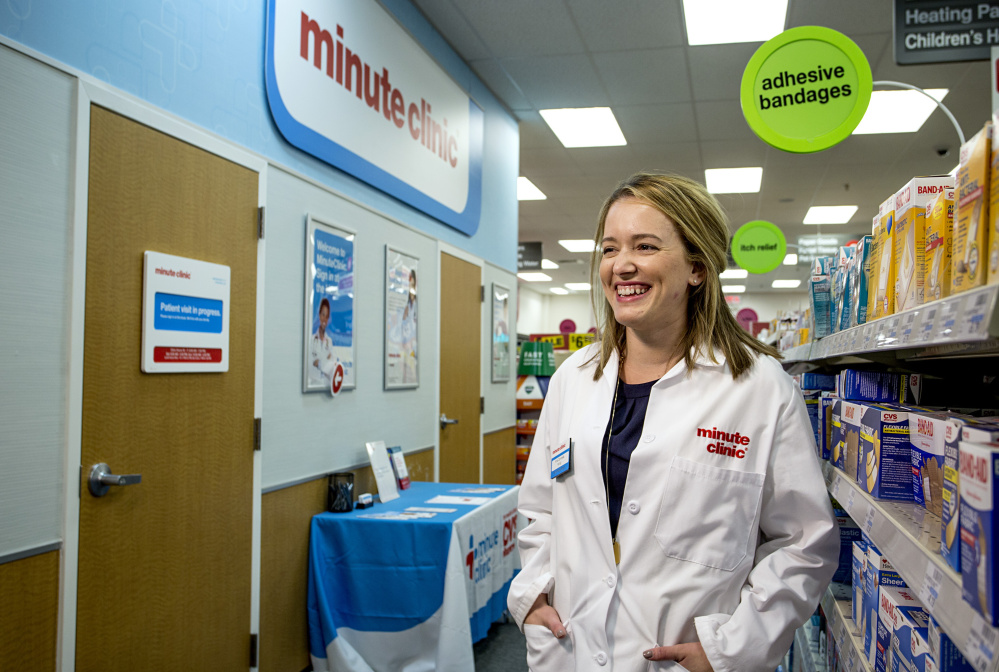
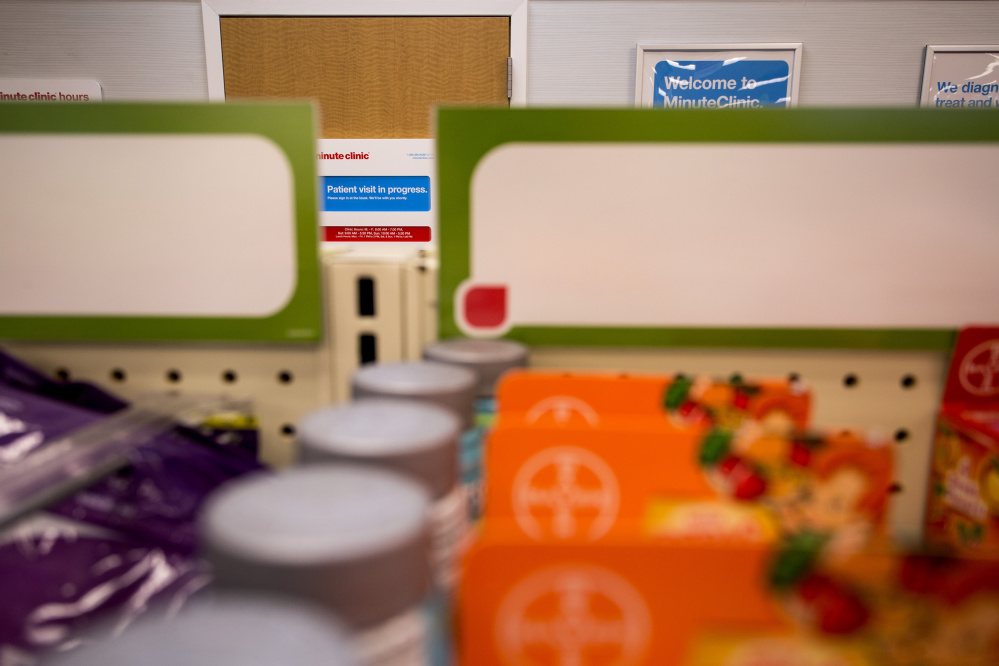
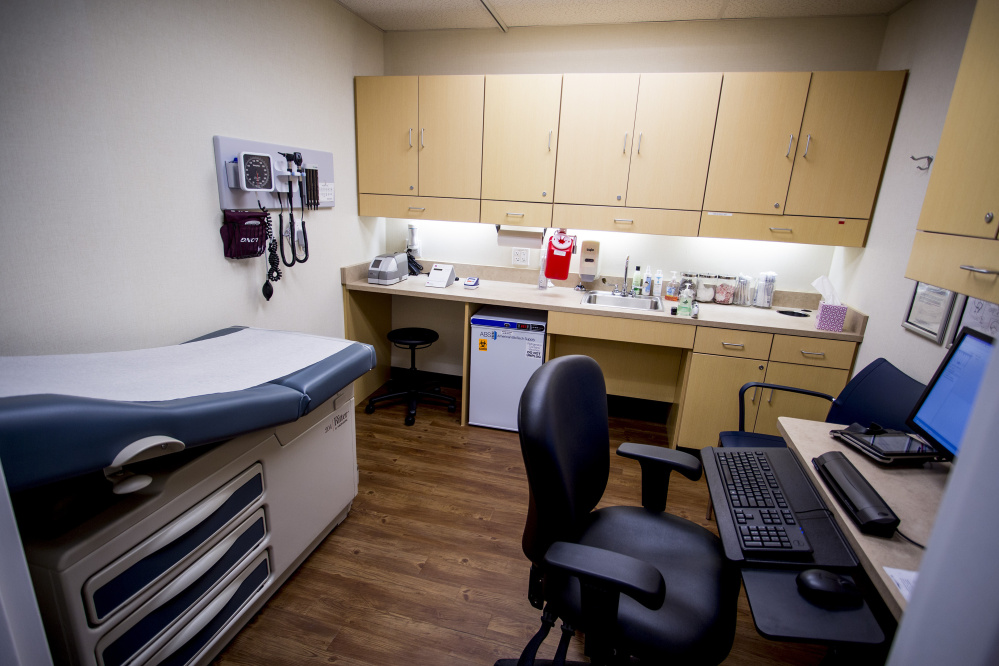
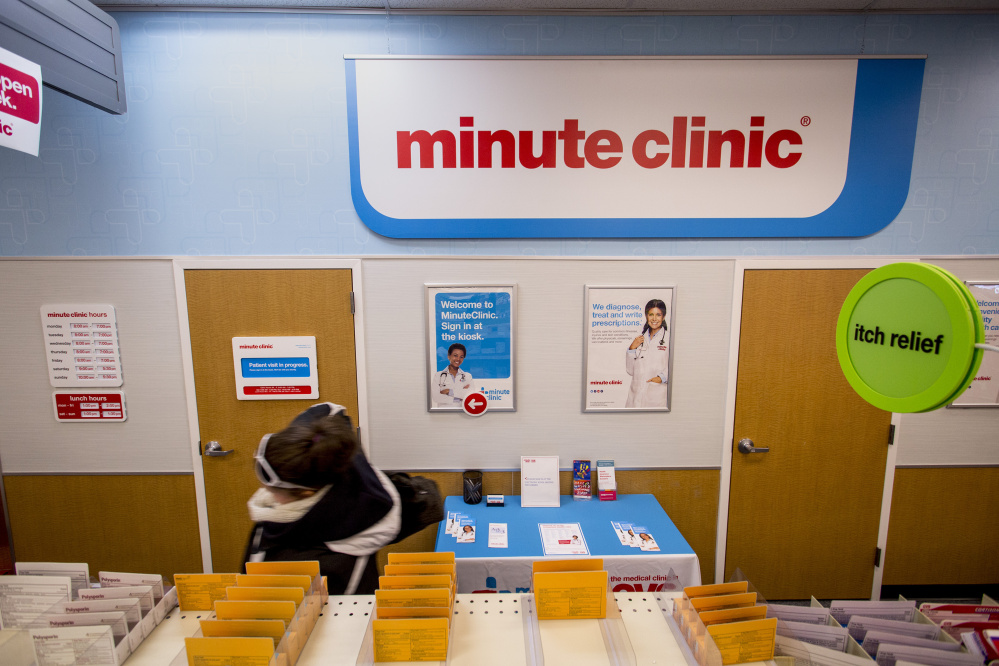
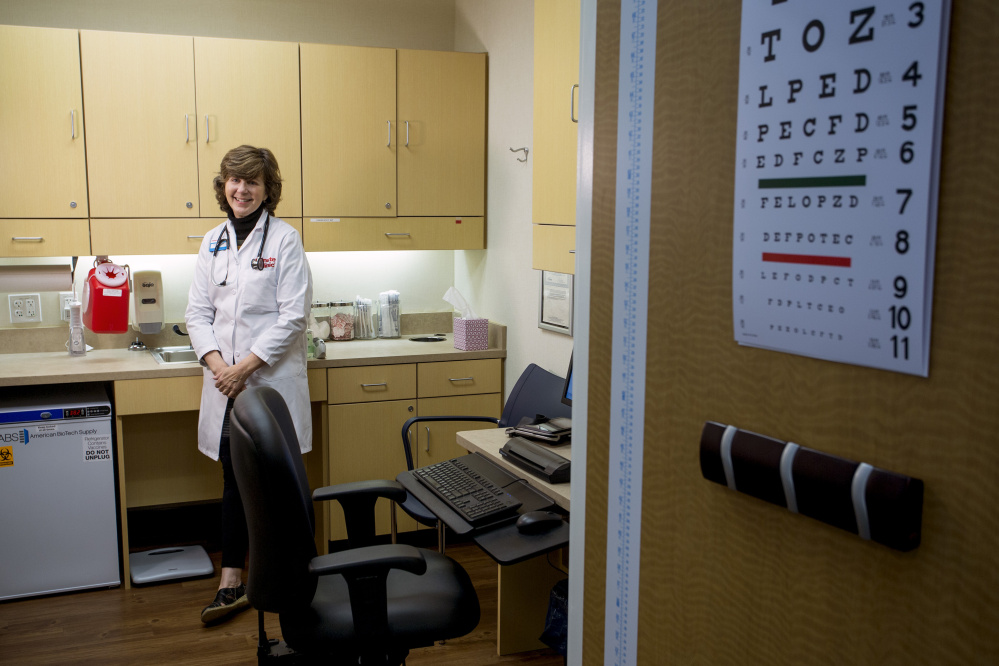
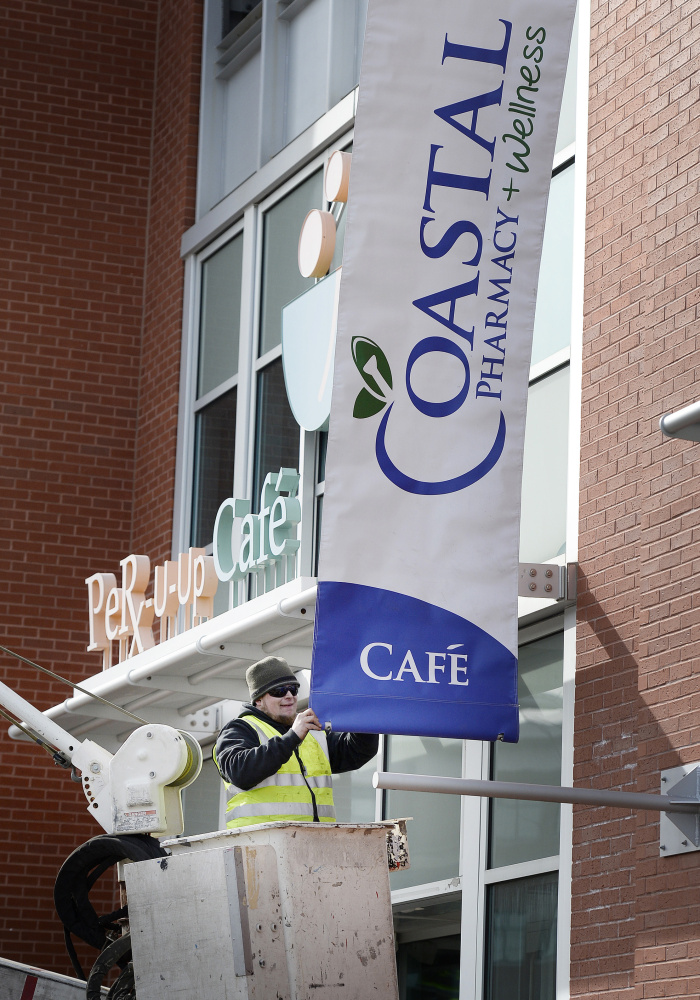
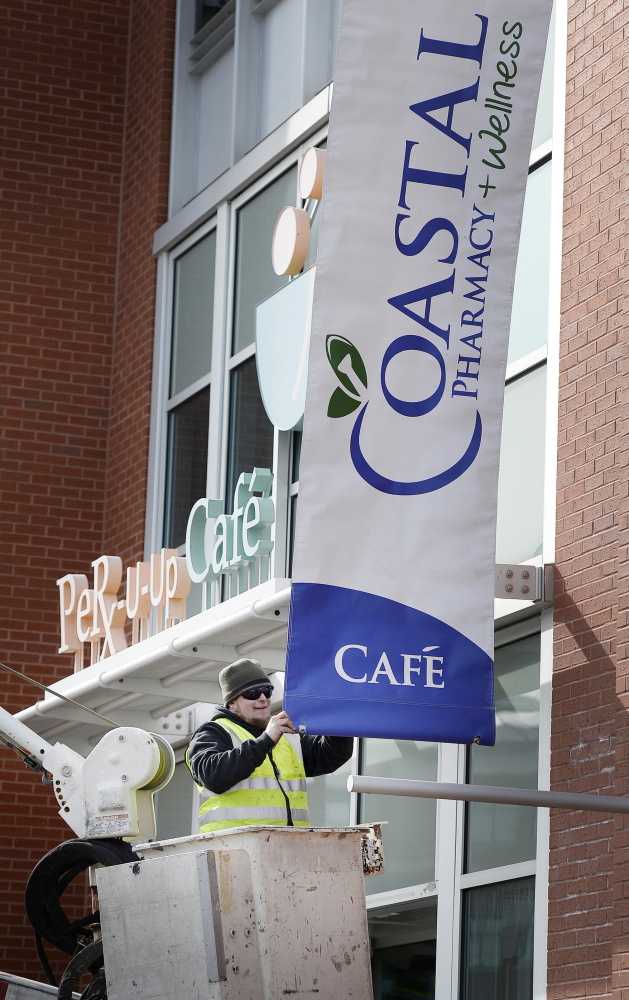

Success. Please wait for the page to reload. If the page does not reload within 5 seconds, please refresh the page.
Enter your email and password to access comments.
Hi, to comment on stories you must . This profile is in addition to your subscription and website login.
Already have a commenting profile? .
Invalid username/password.
Please check your email to confirm and complete your registration.
Only subscribers are eligible to post comments. Please subscribe or login first for digital access. Here’s why.
Use the form below to reset your password. When you've submitted your account email, we will send an email with a reset code.